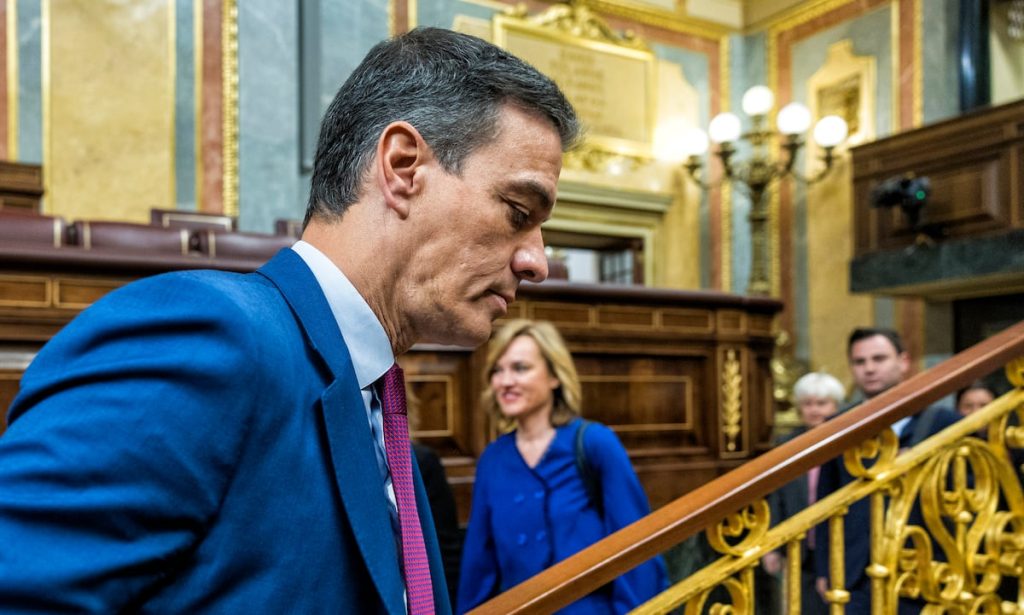The President of the Government, Pedro Sánchez, denounced a campaign of harassment and attacks by the right and far-right against him through his wife, Begoña Gómez, based on lies spread by some media outlets and amplified by false accusations in the courts by an ultra pseudo-union, Manos Limpias. After learning that a judge had admitted the latest complaint from Manos Limpias and opened proceedings against his wife for alleged influence peddling, the President addressed a letter to the citizens, published on his X account, announcing that he will take a few days to reflect on his future and whether he should continue leading the Government or resign from this position. He has canceled his public agenda until next Monday, April 29th.
Based on exhaustive investigations conducted by this newspaper, there does not appear to be a single piece of evidence that Begoña Gómez’s activities constitute what the Supreme Court jurisprudence considers influence peddling. In the two cases that the Popular Party has been denouncing for several months based on information from said media, there is no evidence that Gomez’s activities and professional relationships have influenced in any way the grants awarded to certain private companies. Pedro Sánchez’s political career has been characterized by his ability to withstand the worst setbacks and his tendency to make dramatic gestures to overcome all crises since he first took over as Secretary General of the PSOE. This announcement seems more motivated by an emotional impulse – the harm to his wife – than by a tactical move seeking to draw attention to the dangerous swamp in which public life unfolds and to gain momentum amid the intense political moment in Spain, where two very important elections will be held before the summer. The only thing confirmed is that not even his closest collaborators knew of such a move by the head of the Executive, who will announce next Monday whether he will continue leading the government or resign.
His reflection opens a debate on the limits of the partisan struggle for power, on the existence of sufficient mechanisms in the judiciary to avoid suspicions of lawfare – political use of the courts – that hover over certain judges who seek to exercise legislative or executive power from their courts which they do not have, and on the perverse effects of misinformation aimed at personal destruction. The compilation of fake news that the judge has admitted for processing in the complaint includes a hoax attributing a grant to the President’s wife which, in reality, was awarded to a businesswoman from Cantabria who also goes by the name Begoña Gómez. The defenselessness caused by these libels, organizations like Manos Limpias, and judges who, at the very least, rush to admit such garbage as evidence, affects the rights of all Spanish citizens. That website had to clarify several days later, when the hoax was rampant, that it was not Pedro Sánchez’s wife. The reading of the entire complaint by Manos Limpias maintains the same level. It is a story full of baseless value judgments based on excerpts from news stories appearing in digital media with, in many cases, inaccurate information, and in others, outright falsehoods. With this evidence, a judge has decided to open an investigation for influence peddling.
The toxic public climate that Spain has been experiencing since the elections on July 23rd, when the expected results were not achieved, and Sánchez obtained his investiture in exchange for amnesty for those involved in the process, has resulted in attacks from the right and far-right attributing serious crimes to him, harassment of socialist headquarters and politicians’ homes from this party, and parliamentary filibustering that wears down institutions and diverts attention from the real challenges facing Spain. The straw that broke the camel’s back was the opening of a judicial investigation into his wife, who has been subjected to all kinds of defamation on social media for years. President Sánchez questions whether it is worth continuing to lead the government under these conditions. And he does so in a letter that includes personal reflections, an unprecedented format in this democracy that caused absolute bewilderment on Wednesday. It is a kind of personal vote of confidence before the citizens with a certain plebiscitary air.
These four days of reflection announced by Sánchez will be days of uncertainty in a European country with a robust economy and an increasingly important role on the international stage but also in need of an ethical regeneration of public discourse, its judicial bodies, and its media.


